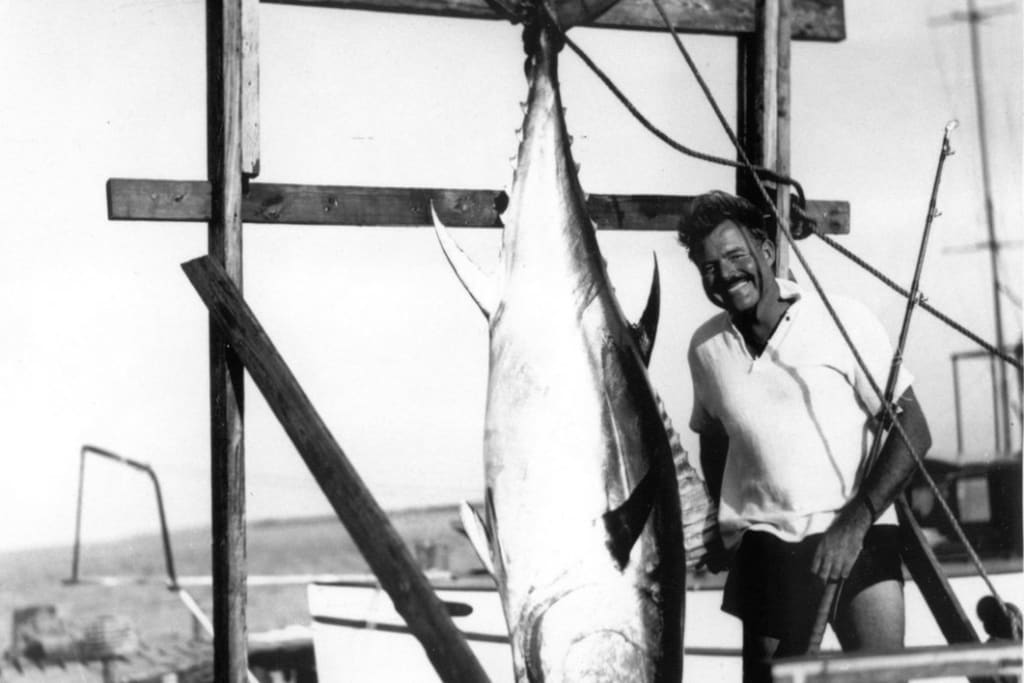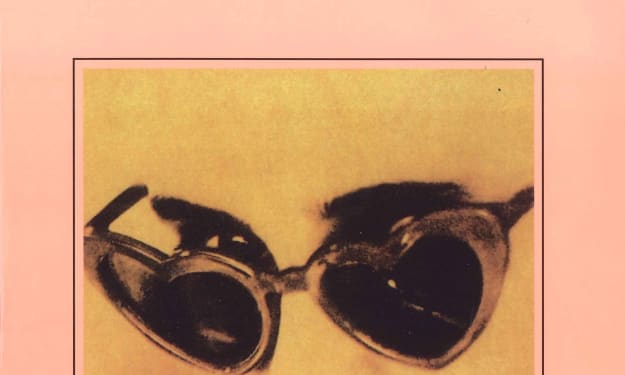The Pleasures of Hemingway and Freud
An Invisible Claim in Ernest Hemingway’s “The Pilot Fish and the Rich” from the novel A Moveable Feast

In “The Pilot Fish and the Rich,” a vignette included in the restored version of Ernest Hemingway’s last novel, A Moveable Feast, published posthumously in 1964, one can make the invisible claim that human minds are influenced by Sigmund Freud’s pleasure principle. We avoid unpleasure and seek pleasure. However, the ego’s instinct for self-preservation attempts to replace the pleasure principle with the reality principle which, out of practicality, postpones the ultimate pleasure we are seeking. Our sexual instinct, which is difficult to educate, often succeeds in overriding the reality principle to the detriment of the organism (Freud 3-7). Poor Papa is the poster boy for the pleasure principle. This vignette is an anguished memoir of his love for two women, his first wife Hadley, whom he eventually betrays, and the woman he betrays her with, Pauline Pfeiffer, his second wife.
Freud elaborates that our mental activity is automatically governed by the pleasure principle. The id is our unconscious and uncensored pleasure core, the first element of the psyche to develop in babies. Later, the id is restricted by the ego, serving the reality instinct, through which we weigh our choices and consider which are in our best interest. The last area of the psyche to develop is the superego, our conscience. Freud also tells us that conscious psycho-physical acts are pleasurable when they offer us stability, becoming increasingly unpleasurable as stability decreases (Freud 5). Tension is always present since our instincts often contradict each other. We aim for what we desire, ideally within reason. Hemingway’s desire for Pfeiffer begins innocuously enough. “First it is wonderful and fun and it goes on that way for a while,” (Hemingway 217). Until meeting Pfeiffer, Hemingway’s mental processes are stable with the pleasure of loving his wife and son. His instability results from the tension caused by his infidelity and Pfeiffer’s growing demands to have him for herself. Although Hemingway attempts to employ the reality principle, postponing his affair to increase the stability of his marriage and to ease his guilt-wracked mind, his sexual instinct gets the better of him. The reader can feel Hemingway’s angst as his id grapples with his superego, his reality instinct trampled in the fray while his id gains ground. He writes, “All things to be truly wicked must start with an innocence. So you live day by day and enjoy what you have and do not worry. You love both and you lie and hate it and it destroys you and every day is more dangerous and you work harder and when you come out from your work, you know what is happening is impossible, but you live day to day as in a war. You love them both now and you are gone. Everything is split inside of you and you love two people now instead of one,” (Hemingway 217). Hadley finally discovers the affair and insists that he and Pfeiffer separate for 100 days, hoping that their passion will dissipate with distance. It doesn’t. Hemingway writes of that 100 days spent with his wife: “I loved her and I loved no one else and we had a lovely magic time while we were alone. I worked well and we made great trips, and it wasn’t until we were out of the mountains in late spring, and back in Paris that the other thing started again,” (Hemingway 218).
Hemingway tortures himself. In the tripartite of the psyche, his id fans the flames of desire for Pfeiffer, his ego tries to enforce the reality principle and his superego promotes guilt and regret as he searches for scapegoats. One of those scapegoats is Pfeiffer, whom he characterizes as just short of a calculating schemer, thus assuaging his superego and the unpleasure it is inflicting on him. Pfeiffer had come to live with the Hemingways as an unmarried young woman who becomes the temporary best friend of the wife. Hemingway writes that the change in family dynamics is an infiltration “that horror winter using the oldest trick probably that there is,” (Hemingway 215). The duel between his id and superego is evident when he vacillates between blaming Pfeiffer, the pilot fish and himself for his growing dilemma, claiming at times that Pfeiffer is the usurper into his unbreakable relationship with his wife. Pfeiffer “unknowingly, innocently and unrelentingly sets out to marry the husband,” (Hemingway 216) He then accentuates the idea of Pfeiffer’s blame by his choice of a thrice repeated sentence: “Then the one who is relentless wins,” (Hemingway 215-217). And he writes thrice of the destructiveness to a man “when the unmarried one decides to marry.”
The pilot fish, unnamed in the story but who is the writer John Dos Passos, introduces his trusting friend Hemingway to Pfeiffer and to the debauched rich described in the vignette. Early in the story Hemingway also blames Dos Passos and the rich for destroying his marriage because they are complicit and approving of his affair. “I had hated these rich because they had backed me and encouraged me when I was doing wrong,” (Hemingway 219). Of Dos Passos, Hemingway writes, “Only those who trust him are caught and killed,” (Hemingway 214).
Freud’s pleasure principal includes the competing instincts of death and life, Thanatos and Eros, in which humans move decidedly toward an inevitable death, but while on that path we seek love and sex for the purpose of reproduction, thus building something larger than ourselves, which will live on. Eros is also represented by the sexual instinct. Thanatos and Eros play in Hemingway’s vignette, when he writes of being caught and killed by the pilot fish, and that “the last year was a nightmare and a murder year disguised as the greatest fun of all,” (Hemingway 213).
Without absolving Pfeiffer or the rich, the story unfolds finally into a shared blame, which was Hemingway’s way of easing his own guilt, the manifestation of tension about which Freud writes. He forgives Pfeiffer just enough to allow him to continue loving her, marrying her immediately after his divorce from Hadley. “For the girl to deceive her friend was a terrible thing but it was my fault and blindness that this did not repel me,” (Hemingway 219). By calling Dos Passos a pilot fish Hemingway uses the subtle literary technique of transference to assume partial responsibility. In nature, a pilot fish befriends a shark and has a forked tail, perhaps a reference to Dos Passos’s forked tongue, which makes Hemingway the shark, an incontrovertible destructive predator to those who get close to him. Finally, by accepting blame, Hemingway attempts to realign his psyche in a way the pleasure principle suggests. “Having become involved in it and being in love I accepted all the blame for it myself and lived with the remorse,” (Hemingway 219).
In 1920, Freud expands the pleasure principle by adding that humans repeat certain behavior patterns and this repetitiveness is inevitable. He calls the phenomenon the “compulsion to repeat” in which a human reenacts repressed material as a contemporary experience; in Hemingway’s case, reenacts again and again. These repeated acts are unwished for and exact and “always have as their subject some portion of infantile sexual life,” Freud writes. (Freud 19-20). Hemingway in “The Pilot Fish and the Rich” offers a prognosis in one prescient quote for any person who would live life by deceiving others as he had deceived his wife. “If you deceive and lie with one person against another you will eventually do it again,” (Hemingway 219). This illuminates the dark side of Freud’s principle, pleasure undenied at any cost and a compulsion to incur the cost again. Hemingway eventually cheats on Pfeiffer with the woman who would become his third wife. And on his third wife with his fourth.
Work Cited
Hemingway, Ernest, “The Pilot Fish and the Rich” from A Moveable Feast, The Restored Edition, Scribner, New York, 1964.
Freud, Sigmund, Beyond the Pleasure Principle, Norton, New York, 1961.
About the Creator
Lacy Loar-Gruenler
Lacy Loar-Gruenler worked for a decade as a newspaper journalist and editor. In March 2023, she completed an MFA in Creative Writing and Literature at Harvard University.
Reader insights
Outstanding
Excellent work. Looking forward to reading more!
Top insight
Expert insights and opinions
Arguments were carefully researched and presented







Comments (15)
Insightful analysis. Well reasoned and articulated. I enjoyed it immensely. You've given me greater insight to my own late father, who married thrice. Brings me back to days when I attended university. The bliss of having time to spend analyzing psychology, sociology, literature, pulp fiction, film, and world history. Having read your analysis, I am fondly reflecting on that delicious swell of newly-gained knowledge bumping into conjecture and contradiction, each new piece of insight toughing it out for space in my head, validation on my page, complete with citations of course. Ah, such memories. Thank you for bringing me back to those younger moments. A true gift.
story amazing
Exceptional analysis and a thoroughly developed argument, Lacy. Did you study Freud in school or on your own?
Fascinating read! Coincidentally, I’ve just picked up A Moveable Feast, so this is perfect preparation. Congratulations for top story 🤗
✍️ Lacy, I am stopping by after a hard but soul-satisfying day. How are you? Hopefully, you are finding time to put us closer to seeing your memoir published. 😌 Here on Vocal, I stumbled upon a few lovely works I thought you might like. Below are links to two of them. https://vocal.media/poets/a-dryad-i https://vocal.media/chapters/therapy-s-house . Now, I will settle down with a nice red. 🍷Take care of your wonderful self and talent! 💙
Love it great work! 👍🏻
Respect! Lacy, here you opened the Vocal door to another aspect of your skills. The look at Hemingway through a Freudian lens, which was stellar here, makes you next level. You even provided in-text and Work Cited citations. I must read your bio again and see the home of your professional reviews. OMGoodness, you are an incredible talent! 💙👏✍️💙
It is Friday, and I see that you provided wonderful reading for this weekend... perhaps with a glass of red, though I am missing the end-of-season cherries.🍷 Re: Vocal's grand contest, I noticed it is primarily genre fiction as opposed to literary fiction. I will enter the Fantasy Fiction category, but I know the genre is not always popular on Vocal. If you would like to submit a contest nomination, information at the link might help. https://awards.vocal.media/#categories Enjoy your weekend! 🥂
Excellent article, found this informative and interesting
Hemingway's tale delves into Freud's psyche, revealing intricate human struggles.🌀
Interesting work on two important writers. Thank you!
This was so well written, and I’m endlessly fascinated by both Hemingway and Freud. I don’t believe Hemingway loved either woman, but I think he was emotionally attached to them. There’s a difference. An attachment is about getting your own needs met. He was a great writer and a horrible mess.
Awesome!!! Congratulations on Top Story!!!♥️♥️💕
An amazing citation of both Freud and Hemingway! I haven’t read this Hemingway story and now I NEED to! You’d probably like the book Dopamine Nation. Talks about pleasure and pain in the modern age. Congrats on TS!
Lacy, I swear, our writerly spirits are always aligning! I was just brushing up on Freudian literary theory this past week. Your analysis of Hemingway’s “tripartite of the psyche” is insightful. What’s so fascinating is that Hemingway himself knows that pleasure undenied will become a sin that he repeats. Awareness doesn’t repel him from infidelity, but almost further drives him to it.